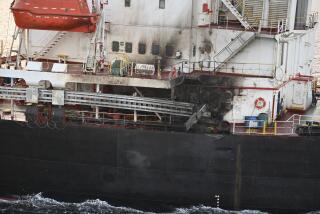Bonn Agrees to U.N. Request for 1,600 Soldiers for Somalia : Military: Coalition acts despite constitutional issue. Troops would be used only in ‘safe zones.’
- Share via
BONN — Chancellor Helmut Kohl’s fragile coalition agreed Tuesday to a U.N. request for 1,600 German soldiers in Somalia but stressed that the armed troops would be used strictly for humanitarian work in “safe zones.”
Nagging constitutional questions over united Germany’s international military role have brought the center-right Bonn government to the brink of collapse in recent weeks, but the Somalia mission appears to have a yellow if not a green light.
Coalition party leaders concurred that the Somalia mission should proceed, and their decision is expected to get a rubber stamp today when it goes to the Cabinet and then to the Bundestag, or lower house of Parliament, for a three-hour debate.
Although the opposition Social Democrats said they consider the Somalia mission morally “correct,” the party said it still may seek assurances from the nation’s highest court that such deployment is legal under the anti-militarist constitution.
The Social Democrats planned to decide today whether to file suit in the Constitutional Court, which just two weeks ago was forced to decide whether Germans could participate in a North Atlantic Treaty Organization mission to enforce the “no-fly” zone over Bosnia-Herzegovina. The court assented in that case but insisted that its order was an emergency measure not designed to set any precedent.
Foreign Minister Klaus Kinkel said the government is taking U.N. General Secretary Boutros Boutros-Ghali “at his word that German soldiers will only be employed in peaceful actions” in Somalia.
“That was the decisive point,” Defense Minister Volker Ruehe agreed.
If deployment begins as planned in two weeks, the German troops would likely be sent to the relatively quiet northeastern region of the strife-torn African nation. Along with transporting and distributing aid to the hungry Somalis, they are expected to offer technical and logistic help, such as building and repairing roads or water systems. German infantrymen would provide protection, but exactly what weapons they will be permitted to use has not yet been clarified.
The anti-militarist German constitution adopted after World War II is widely interpreted as forbidding deployment of German troops outside the NATO theater. Whether these rules apply to peacekeeping or peacemaking missions or to purely combat situations is hotly debated.
Changing the constitution to clarify such matters is unlikely before elections in the fall of 1994, since the opposition Social Democrats hold enough seats in the current Bundestag to block the two-thirds majority needed for constitutional amendments.
The paralysis reached a crisis point earlier this month when Kohl and his Cabinet unilaterally decided that German airmen should be allowed to help patrol the skies over Bosnia in NATO’s integrated AWACS radar surveillance planes, which spot potential targets.
The junior coalition partners, the Free Democrats, filed suit, saying legal questions needed to be answered before troops could be deployed outside the NATO area.
More to Read
Sign up for Essential California
The most important California stories and recommendations in your inbox every morning.
You may occasionally receive promotional content from the Los Angeles Times.













